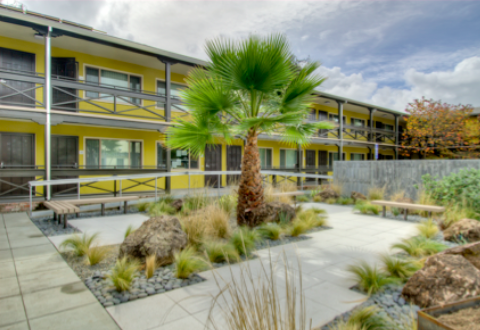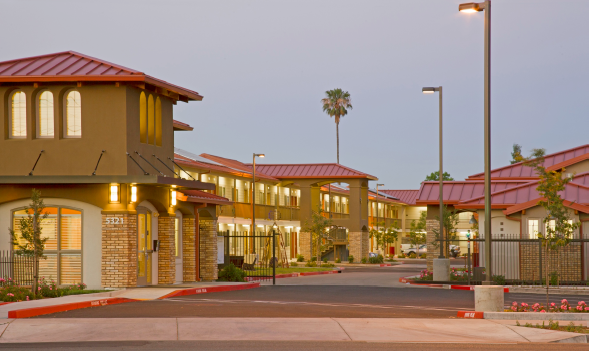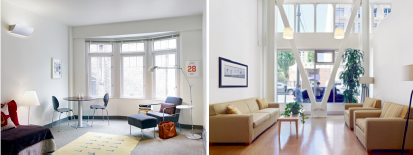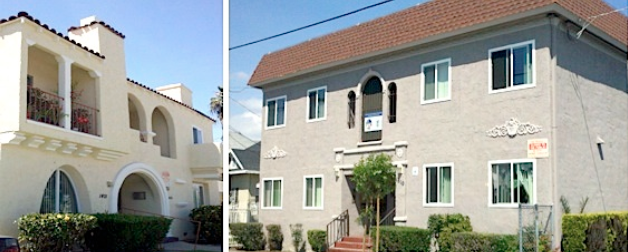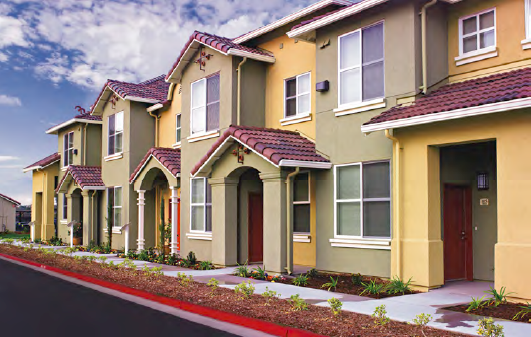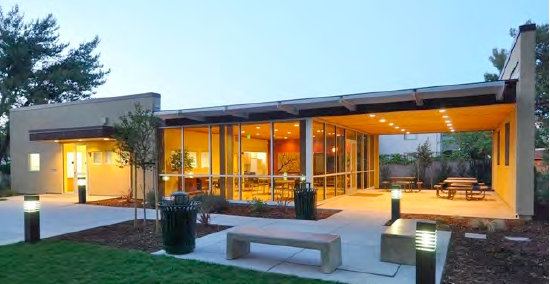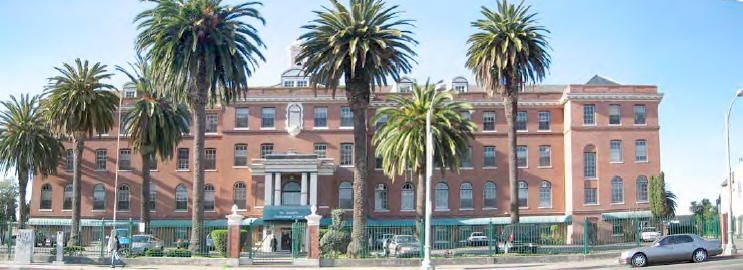Erna P. Harris Court: Supportive Housing for Formerly Homeless in Berkeley “Goes Green”
In 1991, Berkeley-based Resources for Community Development (RCD) first began working on Erna P. Harris Court in Berkeley to transform the 1950’s-era motel into 35 units of affordable, supportive housing for homeless and disabled adults. By 2008, through advancements in green building, RCD was able to rehabilitate the property using Read More
Mercy’s Boulevard Court Apartments: Transformation from Roadside Motel to Supportive Housing for the Homeless
On October 6, Mercy Housing California and the Sacramento Housing and Redevelopment Agency (SHRA) celebrated the grand re-opening of the Boulevard Court Apartments in Sacramento. This partnership succeeded in transforming a once blighted motel into 75 units of permanently affordable housing for formerly homeless individuals with disabilities.
Turk & Eddy: Preserving HUD-Assisted Homes and Creating Jobs with the Help of Federal Stimulus and Redevelopment Funds
The Turk and Eddy apartment buildings are two separate mid-rise buildings built in 1923 and 1925 in San Francisco’s Tenderloin neighborhood, providing 82 affordable studio and one-bedroom apartments for extremely low-income seniors. In 2007, after the property faced the threat of converting to market-rate, the Tenderloin Neighborhood Development Corporation (TNDC) Read More
“Preserving” Market Rate Properties to Reduce Homelessness: The Courtyards in Long Beach
In 2008, Clifford Beers Housing purchased The Courtyards in Long Beach and saw a tremendous opportunity to rehabilitate and preserve the four 1920’s-era, single-story, courtyard-style apartment buildings. The Courtyards was among one of the first projects in the state to use California’s Mental Health Services Act capital funds to create Read More
Preservation of PHD Apartments In Los Angeles Demonstrates Impact of Federal Stimulus and State Preservation Notice Law
In August 2007, Little Tokyo Service Center (LTSC) partnered with the Korean Youth and Community Center (KYCC) to acquire the Professional Housing and Development (PHD) apartments in Los Angeles and preserve the affordability of the property.
Parc Grove Commons: Neighborhood Revitalization in Fresno Made Possible through $5.7 million in Federal Stimulus Funds
In April 2011, the Housing Authority of the City of Fresno (HACF) celebrated the grand opening of Parc Grove Commons, a 215-apartment mixed-income community made possible through $5.7 million in federal stimulus funds from the 2009 American Recovery and Reinvestment Act (ARRA). Through this energy-efficient neighborhood revitalization effort, HACF created Read More
Eden Housing Perseveres in Transforming Low-Income Community in Alameda County
In May 2008, Eden Housing set out to rehabilitate Ashland Village, the 142-apartment community in unincorporated Alameda County. Despite the Section 8 contract facing expiration in one year, Eden succeeded in preserving the affordability of the apartments and creating a healthier, more supportive environment for its residents.
St. Joseph’s Senior Apartments Groundbreaking: Historic Rehabilitation through Tax Credit Financing
The groundbreaking of St. Joseph’s Senior Apartments in Oakland in May 2010 marks the start of a large development by BRIDGE Housing to create affordable senior housing while also preserving a significant historic landmark. The development will include 84 affordable apartments for low and very low-income seniors and ground floor Read More
New Carver Apartments Offers New Solutions for the Homeless in Los Angeles
Skid Row Housing Trust is celebrating the recent grand opening of the New Carver apartments, which will provide 97 efficiency apartments for homeless seniors and homeless men and women with physical disabilities. The development will include onsite healthcare and other supportive services for its residents.
Nonprofit Uses Financing Partnerships to Preserve At-Risk Property Despite Competition
Azusa Apartments is an 88-apartment affordable housing development located in Azusa, California, a Los-Angeles area suburb. The property was built in 1971, subsidized by a U.S. HUD Section 236 loan. After the loan reached the end of its 40-year term in 2012, Community HousingWorks stepped in to preserve the development.

